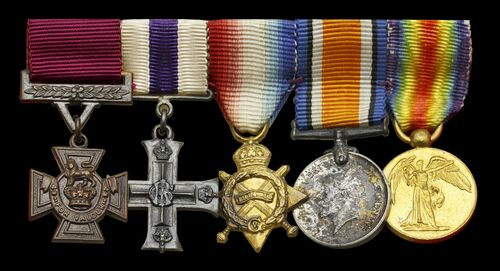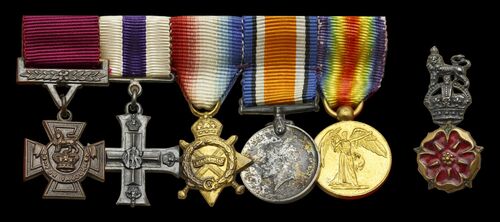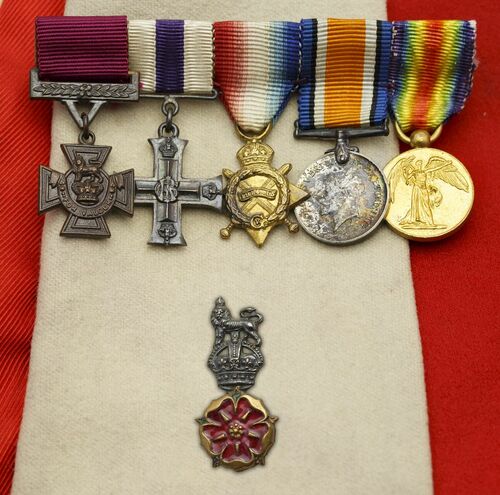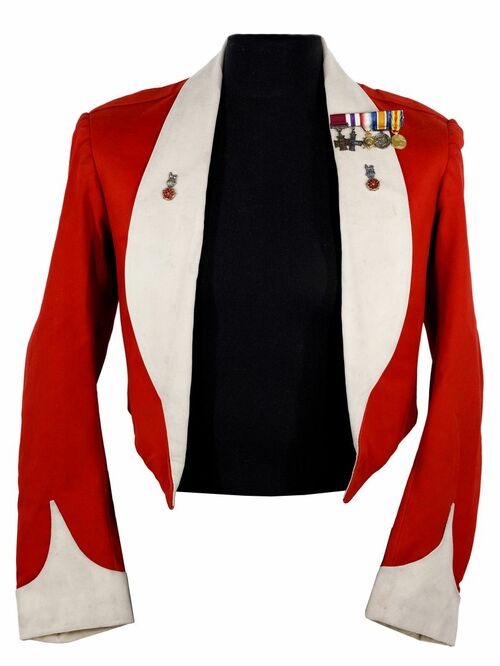Auction: 24111 - Orders, Decorations and Medals - e-Auction
Lot: 973
(x) The superb Great War Victoria Cross dress miniature group of five to Lieutenant Colonel H. Daniels, Rifle Brigade
Victoria Cross; Military Cross, G.V.R.; 1914-15 Star; British War and Victory Medals, mounted as worn, sold together with his Mess jacket, with original tailor's label of H. Lehmann & Son. Aldershot, named to him '2744 Capt. H. Daniels. V.C.', rank insignia on shoulder removed by indicates where a crown and pip had been for the rank of a Lieutenant Colonel, the medals lightly toned, otherwise with wear to the tunic and light moth damage (5)
V.C. London Gazette27 April 1915, the original citation states
For most conspicuous bravery on 12th March, 1915, at Neuve Chapelle. When their battalion was impeded in the advance to the attack by wire entanglements, and subjected to a very severe machine-gun fire, these two men voluntarily rushed in front and succeeded in cutting the wires. They were both wounded at once, and Corporal Noble has since died of his wounds.
M.C. London Gazette 30 March 1916.
Harry Daniels was born on December 13, 1884, in Market Street, Wymondham, where his father, who came from Norwich, ran a bakery business for six years or so. Much of his early years is shrouded in uncertainty. Most accounts of his life have him as the 13th of 16 children to William and Eliza Daniels, but Anne Hoare found records for only ten, though she says others may have died in infancy.
What is certain is that Harry and his siblings soon faced hard times. After barely six years in the town, the family moved back to Norwich where, in the space of a little less than two years between 1893 and 1894, Harry lost both his parents to cancer.
Some of the children were old enough to fend for themselves, but for the five youngest the grief at losing their mother and father was compounded by the heartbreak of separation. Two sisters, Gertrude and Lily, went to the Girls' Orphanage in Chapelfield and Harry and elder brother Robert were taken into the care of the Boys' Home in St Faith's Lane, while a younger brother, Joseph, was farmed out to Downend Cottage Homes, near Bristol.
Such blows might have broken lesser spirits, but not Harry. Nicknamed 'Spitfire' with good reason, he was as daring as he was irrepressible. He absconded twice, on one occasion making his way to Great Yarmouth where he signed up as a cabin boy on a herring drifter.
Eventually boarded out, Harry was apprenticed as a carpenter at the Duke's Palace Steam Joinery Works, but such humdrum work hardly satisfied his thirst for adventure. Aged 18, he followed his brother William, a Coldstream guardsman killed in action during the Boer war, into the army.
It proved a turning point. In the 2nd Battalion, the Rifle Brigade, Harry found his métier. Over the course of 11 years, mostly spent on garrison duty in India, he rose from Rifleman to senior Warrant Officer. By any standards, it was a remarkable rise, but in peacetime it was positively meteoric and owed much to his sociability and sporting prowess.
An outstanding gymnast, he was also a champion lightweight and welterweight boxer as well as being a leading member of the unit's amateur dramatic club.
Far from curbing his eternally high spirits, the war served only to bring out the best in him. Already a well-respected NCO, he quickly made a name for himself as a frontline soldier in the trenches of northern France.
Made Company Sergeant Major in D Company a few days after his arrival on the Western Front, he struck one of his officers as a 'born leader'. To Lieutenant R C Mansel, the 29-year-old, recently married warrant officer was 'light hearted and very brave, and terrified me out of my life'.
He wasn't the only person who found Harry's reckless gallantry inspiring and disturbing in almost equal measure. Another officer remembered him with affection bordering on awe. 'A more fearless man you could never meet,' he wrote. 'He strolls about the trenches with his hands in his pockets yelling at everybody who does not take proper care of himself, but he seems to consider himself specially privileged to take all the risks there are.'
By March 1915, as Harry prepared to take part in the British army's first serious attempt to break the deadlock, his name was already a byword for courage within his unit, but his actions around the village of Neuve Chapelle would elevate him to the status of national hero. Like so many battles fought that year, initial success quickly gave way to bloody stalemate. 'Three more unhappy and miserable days I cannot imagine,' wrote Lieutenant Mansel. 'But Daniels never lost his smile, never was downhearted…'
Indeed, as far as Mansel could tell, Harry was 'in his element' throughout – even during the battalion's darkest hour on the grim, grey afternoon of March 12. Two enemy counter-attacks had been repulsed and an ill-conceived advance by the 2nd Rifle Brigade defeated with heavy losses before orders were received to renew the assault.
The folly and futility of such a charge was plain to all manning the frontline, but higher command was insistent that the attack, timed for 5.15pm, should be pressed home, 'regardless of loss'.
What seemed to Harry's commanding officer a 'mission impossible', teetered on the suicidal for the men of D Company who were to lead the assault. Between them and an enemy line bristling with machine-guns was a tangle of barbed wire barely 15 yards distant that would have to be negotiated in clear view of the German trenches.
With time short, Lieutenant Mansel, who had been elevated on account of casualties to temporary commander, turned to Harry and told him to detail a party to go out and cut paths through the wire ahead of the attack.
For possibly the first and almost certainly the last time in his career as a soldier, Harry, the consummate professional, chose to disregard an order. In his own recollection, he later acknowledged: 'It had got to be done, [but] what could I do? I could not tell men that what they had to go and face was almost certain death. What I always say is, if there's anything to be done, don't talk about it, but get on with it.'
And that is precisely what he did. Turning to his close friend, Corporal Cecil 'Tom' Noble, he calmly said, 'Come on Tom; get some nippers', and, thus armed, they climbed out of their trench and dashed straight through a torrent of fire to reach the wire unscathed.
For the next few minutes, as bullets flailed the ground around them, they hacked at the wire, seemingly oblivious of the enemy reaction. Lying in all manner of positions and with nothing but their courage to sustain them, they continued to wield their heavy duty steel cutters until their luck finally ran out.
Harry was the first to be hit. 'A bullet passed clean through my left thigh,' he said. Moments later, Noble was struck by a bullet in the chest. For a while, they struggled on, before Noble faded into fatal unconsciousness and Harry managed to drag himself to the precarious shelter of a shell-hole.
Their self-sacrifice was all in vain. What the regimental historian described as 'a disastrous day of squandered heroism' was climaxed by an attack that succeeded only in adding to the unit's already long list of casualties.
Harry's own survival was little short of miraculous. After four hours spent feigning death, he emerged from his temporary shelter and, under cover of darkness, 'dragged myself to our trenches and safety'. He was still in hospital when he learned that his act of valour had been recognised by the award of the Victoria Cross, an honour shared posthumously by his friend, and convalescing when he received a hero's welcome home in June 1915.
Accompanied by Kathleen, his wife of a little more than a year, 'Dan VC', as he was swiftly dubbed, was feted wherever he went with crowds of people in their thousands cheering themselves hoarse for Norfolk's first great hero of the war.
Granted a civic reception in Norwich's Guildhall, he and his wife were the 'star turn' at the city's Hippodrome Theatre where they took to the stage to the prolonged applause of a packed house.
Harry fitted the role of local hero perfectly. Ever modest, ever smiling, he was Norfolk's own 'laughing cavalier', as proud of his roots as his fellow citizens were of him.
Four months later, however, the eulogies gave way to the last rites as the local press reported the death 'in action' of the newly commissioned Lieutenant Harry Daniels VC. One obituary concluded: 'And so this brilliant and fascinating life history has come to a close. As for the sentiments of Norwich, it can be truthfully said that they are sorrowful almost to the point of tears.'
But it was all a mistake. Within days, the same newspapers were joyously retracting their misinformed reports. Harry, the great survivor, was very much alive and proving that his earlier exploit was no flash-in-the-pan.
As a patrol leader displaying his habitual heroism he yet again risked his life to save others. The result was a Military Cross to add to his VC 'for conspicuous and consistent gallantry'.
Wounded again slightly and then more seriously going 'over the top' on the first day of the Battle of the Somme, he characteristically bemoaned his hospitalisation rather than count his lucky stars, writing to a friend: 'I was wild to know that I could not go on.'
Norfolk's seemingly indestructible hero finished the war serving as a captain in the British Military Mission to the United States with two mentions in despatches to set alongside his awards for gallantry, but the list of accomplishments did not end there.
This jacket and other uniforms were given to the props department of the theatre after his death by his immediate family.
Subject to 5% tax on Hammer Price in addition to 20% VAT on Buyer’s Premium.
Sold for
£2,200
Starting price
£320











